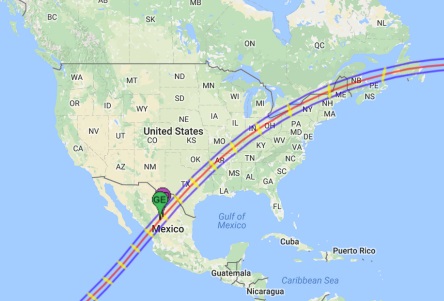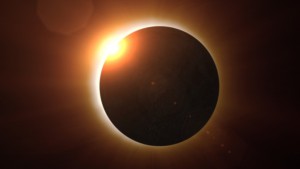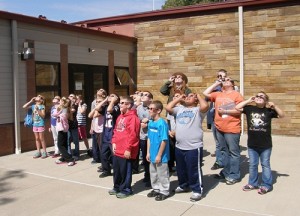

If adults do a little bit of planning and organization, millions of kids will experience the most exciting science event of their lifetime on April 8, 2024.
My family just got back to our home in Minnesota after travelling to view the
total solar eclipse in Nebraska on August 21, 2017. It was about a 500 mile drive,
but it was well worth it. In a narrow band stretching across the country, the sky
went dark, stars were visible in the middle of the day, and we were able to see
something that few people ever get to see: The corona of the sun glowing about as
bright as the full moon. It hadn't happened in the continental United States since
1979, and it was my first chance to see it.

I had to wait 38 years, but fortunately, most Americans don't have to wait that long for the next opportunity. Another total solar eclipse will take place on Monday, April 8, 2024, and it will be visible in the United States, Canada, and Mexico. Millions of people will be able to see it as it crosses the states of Texas, Oklahoma, Arkansas, Missouri, Kentucky, Illinois, Indiana, Ohio, Pennsylvania, New York, Vermont, New Hampshire, and Maine.
It's a particularly exciting opportunity in 2024 because it will pass over a number of large cities, including Austin, Dallas/Fort Worth, Little Rock, Indianapolis, and Buffalo. And in those cities, school will be in session, meaning that millions of kids will be inspired by the most dramatic scientific event of their lifetime. All they need to do is step out into the schoolyard, and they will be able to see the most exciting sight they have ever seen.
If you are an educator, when is the last time you saw your students be truly
excited by a science lesson to the point where they spontaneously start
cheering? It's probably never happened to you, but it did happen at a lot of
schools in 2017. School was in session in many places during the 2017 eclipse. The
kids went outside to watch, and they spontaneously cheered when the sky went dark.
They got excited about science. For just one sample, watch this video of kids in
Missouri watching the 2017 eclipse:
This is only one of hundreds such videos showing kids getting truly excited about science. Unfortunately, in 2017, a lot of kids missed out on the science lesson of a lifetime because their schools didn't plan for it. School was in session in many cities a short distance away from the total eclipse. Some of these schools did their best without advance planning, and had the kids watch the partial eclipse. A partial eclipse is interesting, but it's lacks the excitement of a total eclipse. Even if the sun is 99% covered by the moon, it doesn't get dark outside, stars aren't visible, and you can't see the corona of the sun. In fact, if you didn't know about it in advance, you probably wouldn't even notice. It's interesting, but it's not exciting. Your kids won't spontaneously cheer about a partial eclipse.
Despite lack of planning, many schools outside of totality did their best in
2017, and at least took the kids outside to witness the partial eclipse.
Shamefully, though, some schools locked the kids inside and didn't let the kids see
it at all. Like primitive humans, they were afraid of the eclipse, and they were
unwilling to take the simple safety precautions to let the kids safely view it.

But even the schools that let the kids see the partial eclipse could have done better if there had been more advance planning. In 2017, millions of American kids were a short bus ride away from seeing the total solar eclipse. With just a little bit of planning, many kids could have witnessed the total solar eclipse. They could have gone on a field trip that day, and they would have spontaneously cheered about their science lesson. This was a missed opportunity for kids of every social class. Some parents can't afford to take their kids to see natural wonders like the Grand Canyon or Yellowstone. But in 2017, there was an equally spectacular natural wonder, and thousands of schools had the opportunity to take students to see it. But they didn't plan in advance, and the opportunity is gone.
We have another opportunity in 2024, and we can't miss this opportunity. Millions of kids will be able to see the eclipse at school, in cities like Dallas, Indianapolis, and Buffalo. Those kids are lucky, because even if their schools fail to plan ahead, they can still make the necessary arrangements at the last minute.
But there are other kids at risk of missing out on this opportunity, and educators in their communities need to plan ahead. Millions of kids fall in this category. They live in places like Houston, Oklahoma City, Memphis, Nashville, Chicago, Louisville, Cincinnati, Detroit, Pittsburgh, and Albany. Those kids have the opportunity to make a one-day field trip to see the most spectacular natural event they have ever witnessed. But it won't happen unless the adults in their lives make it happen, and that means that those adults have to do some advance planning.
This is why I am proposing Eclipse Ambassadors. In many cases, kids will need to go on a field trip of 100 miles or more. That can be done, but it would be easier with some help. And there are two groups that can be tapped to provide that help. First of all, there are schools within the path of totality in places like Dallas, Indianapolis, and Buffalo. They will be outside watching the eclipse, and they can host students and teachers from other areas like Oklahoma City, Chicago, and Pittsburgh. They can provide a safe desination for the eclipse field trips. In the process, they will be able to build friendships with students from another city and with different backgrounds.
And there's another group that will be eager to help out: The students who were able to view the 2017 eclipse. They are in cities like Salem, Oregon; Idaho Falls, Idaho; Casper, Wyoming; Grand Island, Nebraska; Kansas City, Missouri; Nashville, Tennessee; and Charleston, South Carolina. They saw the eclipse in 2017. They were excited by what the saw, and they want to share their excitement and see another one. The seventh graders and above who saw the 2017 eclipse will have graduated before the 2024 eclipse, and I'm sure that most of them will take a day off from college or work to go see it. But the kindergarteners through sixth graders who saw the eclipse in 2017 will still be in school. They will be in grades 6-12, and they'll be eager to share their excitement with students in other parts of the country. And many of those schools will organize field trips, even though many of them will have to travel hundreds of miles and arrange overnight accommodations. They will do that because they know how exciting the eclipse was, and they'll want to see it again. Those sixth through twelfth graders can truly be eclipse amabassadors, spread excitement about the eclipse, and help schools plan for the 2024 eclipse.
I want to make sure these three groups can come together to make sure as many kids as possible experience the 2024 eclipse. At this point, I don't know how it's going to happen, but I want to make sure that there's some kind of clearinghouse to enable these groups to come together. It might be as simple as having a message board where schools can come into contact with other schools. Or it might turn into a more formal organization that assists them in making those contacts and making the necessary arrangements.
Keep watching this page to see how those plans develop. I welcome input and suggestions on how to make this happen. I've created a Facebook group to facilitate discussion, and I welcome anyone who is interested to join this public group. Also, feel free to contact me at clem.law@usa.net.
 About the Author
About the AuthorRichard Clem is an eclipse chaser in Minnesota. When he is not chasing eclipses, he is a public school teacher as well as an attorney, and also presents continuing legal education programs for attorneys. You can visit his blog at OneTubeRadio.com. His blog posts about eclipses are available at this link. The web page for his law office is RichardClem.com, and his amateur radio website is w0is.com.
Richard P. Clem
PO Box 14957
Minneapolis, MN 55414
Phone: 612-378-7751
e-mail: clem.law@usa.net